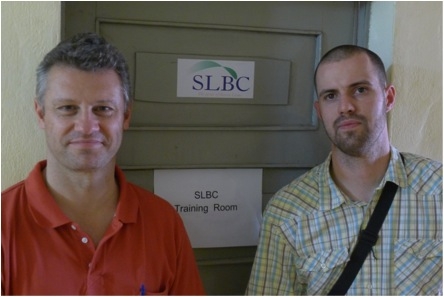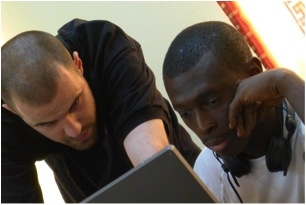
Deutsche Welle Akadamie trainers, Christopher Springgate (left) and Florian Kroker in front of the newly minted SLBC Training Room. March 4, 2011

Deutsche Welle Akadamie trainer, Florian Kroker (left), demonstrates package editing to a camera operator.
Training. Capacity-building. Resource development. Things that everyone from President E.B. Koroma and Board Chair Septimus Kaikai to Idrissa, a camera operator, and Emmanuel, a radio presenter, have yearned for at the year-old Sierra Leone Broadcasting Corporation (SLBC), the country’s first public broadcaster. The need for training is ever apparent and almost universally recognized here in Sierra Leone. In fact, when SLBC was officially incorporated in 2010, the president spoke about the potential for training, capacity-building and the need to develop local talent, on-air and behind-the-scenes, at the nation’s broadcaster. The United Nations, a media partner with SLBC, is committed to training, as is the International Center for Journalists, which is why and how I ended up working with SLBC.
For months, we’ve been making due in cramped, hot, dark, leaky rooms for training sessions. I’ve offered sessions for camera operators, management staff, marketing and commercial folks, radio presenters, TV anchors, etc., in rooms with no electricity, where rain poured through the roof in the rainy season, without flipcharts, sitting on the floor or on overturned crates and writing on sweat-soaked notebook pages. Through it all, the journalists, staff and freelancers have endured, quite remarkably ready for more… and more. The training is taking effect. After all, as I keep saying, it’s “content” that matters, whether we’re learning from a slick PowerPoint presentation or via a 50’s-era blackboard and chalk. Content is king, as I wrote in my very first blog.
And now, officially, SLBC has its own dedicated training room. On Feb. 26, I taped a note to a third-floor door, “SLBC Training Room”, and we welcomed German trainers from Deutsche Welle Akadamie to our new facility. Of course, it wasn’t as easy as unlocking the padlock and opening the door.
On Jan. 3, the new director of administration and human resources took up his post at SLBC. Thomas Sowa, an experienced and dedicated Sierra Leonean who’d worked in the U.S. for years, is a strong ally in our rallies for further training and more adequate resources for staff. When he saw the conditions we were training under, he advocated with the board and management of SLBC for a dedicated training facility. Armed with reams of reports, statistics and project proposals, he somehow worked his magic to procure a room on the third floor of the Broadcasting House.
Physical space in the Broadcasting House is very limited. People work two, three or four to a room. Thomas, a senior manager, for example, shares his office – a closet-sized room - with three others. Desks and tables are at a premium. Filing cabinets are non-existent. Electricity is hit-and-miss, and Internet facilities are often dreamt of but seldom realized. Air conditioners are rare and when there is one it’s often so dirty and inefficient it’s not worth trying to plug the thing in… and it’s not advisable to operate air conditioners when the generators are running (more than half the time).
Thomas allocated a former technical room to be our new training facility and diligent renovation work began. SLBC technicians cleared out years and years of accumulated spare parts, broken equipment, wiring, dismantled studio mixers, outdated equipment and assorted reel-to-reel tape players. Broken chairs, three-legged desks and wobbly tables were removed, leaving a dirty, bare room.
I spent most of the weekend of the 27th of February gathering paint, brushes, wall putty to repair holes, some electrical wire, brooms, buckets and a mop. There’s no water on the third floor, so I lugged water up from the first floor and mixed paint in an old water bottle. After hours and hours of painting (no rollers and pans) the room looked fresh and clean. Nothing resembles a Michelangelo mural, but it’s functional. The end wall is now a white “projection” wall and the air conditioner has been cleaned and maintained. There’s electrical wiring and power at one end of the room and tables were made to accommodate participants. Plastic chairs were brought in and it now feels like a “real” training/resource facility.
We’re hoping to have an official opening of the room and because President E.B. Koroma has such an interest in SLBC and training, we’re hoping he’ll pass by to cut an official ribbon and help us celebrate.
Currently, Deutsche Welle trainers are firmly ensconced in the training room. We’ve got the room booked for BBC World Service Trust trainers, customer service training for marketing staff, management training and presentation training. The new SLBC Training Room will be well used. And while we continue to struggle for space, “possession is 9/10ths of the law” and we plan to make good “possession” of this room.